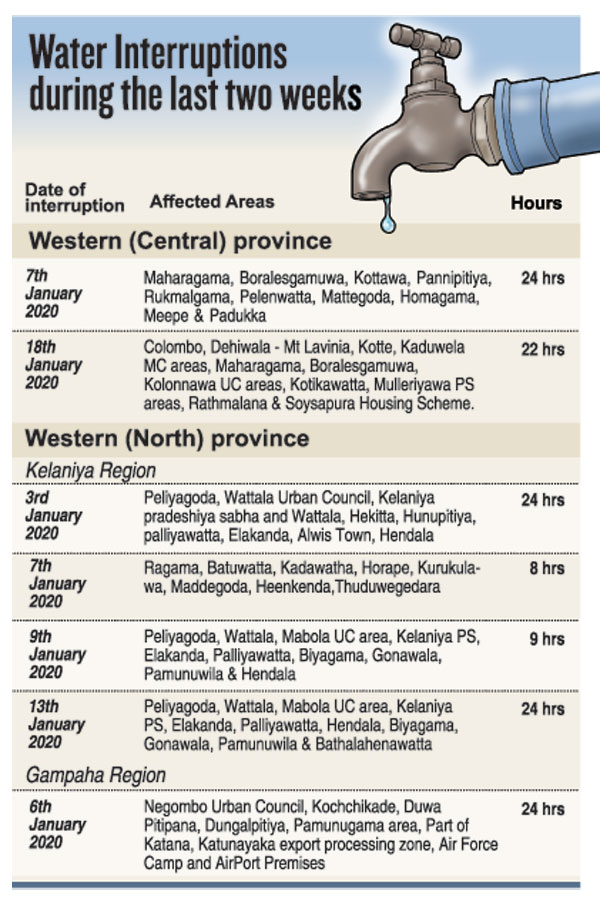News
Board hammered over water cuts points finger at CMC
The long hours of water interruptions in Colombo city and suburbs are the result of the council preventing the water board from working in daytime on repairs and projects, board officials said.
The National Water Supply and Drainage Board (NWSDB) revealed that the Colombo Municipal Council (CMC) does not allow it to work on any kind of repairs or development projects during the day, saying this causes road congestion.
“Even if a leak occurs in the morning we are allowed to repair it only in the allocated time slot from 9pm to 5am, as a result of which people have to face longer hours of water interruptions,” the General Manager of the NWSDB, Eng. R.H. Ruvinis, told The Sunday Times.
He pointed out that apart from having to deal with an unexpected breakdown in a main line the water board avoids interruptions in supply but it had no power to prevent interruptions caused by damage to pipes during work carried out by the electricity board, the Road Development Authority and other contractors.
According to Eng. Ruvinis, planned interruptions do occur: for example, work on the new Pattiwila water treatment plant in Makola in the Gampaha district requires the board to interrupt water supply to connect old and new distribution lines. It is hoped the Pattiwila plant, due to be tested next month, will resolve most water problems in the Gampaha district. It was to have been completed last November but was delayed because of the presidential election.
Constant interruptions to water supply in parts of Colombo districts and the city outskirts are causing hardship, with families unable to carry out basic household activities such as washing clothes, cooking and storing drinking water during long hours of water cuts.
Stoppages during weekends are a particular headache for M.B. Anne, a 42-year-old resident of Kotahena.
“Most of our family members go to work and weekends are the only time they stay at home to spend time with their family. When water is interrupted for hours on a day like this it’s worse,” she said.
Eighteen-year-old Thilakshi Perera was annoyed at the lack of warnings of water cuts. “If the authorities inform us beforehand we are usually able to prepare ourselves but in the last week or so they didn’t inform us and we couldn’t collect water in time,” she said.
Others are more fortunate. P.L. Shelton, 53, who owns a small tea shop down Kochchikade Road in Kotahena, said he had always been well informed of pending water cuts.
“The reason may be because my shop is close to the main road,” he said. “I have heard the woes of people living away from the main road: they have always complained of low pressure in the pipes and lack of notice of water supply interruptions.”
An engineer overseeing development work on the Kotahena Junction section of the Greater Colombo Project, Ranga Lakmal, denied the development phase was causing water cuts.
“It’s only once the work is completed that people will experience a slight inconvenience because we have to switch from the old distribution lines to the new one,” he said.
An engineering adviser to the water board, Professor Saman Thilakasiri, said the board’s focus was to increase the number of pumping stations and reservoirs to provide a reliable supply for an increasing population.
“The strategy is to increase the storage of water capacity,” he said.
Eng. Ruvinis said the huge Greater Colombo Project will see 700km of the 1000km of water lines in Colombo City being replaced, and localised water interruptions will be necessary to link the project together.
Most of the pipelines installed up to the 1980s are made of galvanised metal, cast iron and asbestos and are now mostly corroded, he said.
“Our plan is to use polyethylene pipes and ductile iron pipes for distribution lines and discourage the use of PVC pipes for future projects,” he said.
The water board receives about 1,000 complaints a day, mostly about water cuts.
NWSDB statistics show there were full-day interruptions to water supply on no fewer than seven occasions in the past two months in the northern areas of the Western Province such as Peliyagoda Wattala, Seeduwa, Ja-Ela and Negombo.
Two all-day cuts occurred in Mirihana, Nawala, Dehiwela-Mt Lavinia, Kolonnawa, Kotikawatta and Ratmalana in the same period, along with shorter interruptions.
There have also been interruptions in other provinces including a 14-hour cut in the Trincomalee region on January 21.
Reasons for the cuts included repair work caused by roadworks, power cuts, work carried out by sewerage contractors, repairs to fix leaks and problems at water treatment plants.
| More water supply projects to increase the water supply A total of 23 water supply projects are expected to be completed in coming years, increasing supply by 25 per cent, according to the National Water Supply and Drainage Board (NWSDB). Areas that will see new projects begin soon will include Colombo district, Anuradhapura district, Kilinochchi, Naagadeepa, Kalutara district, Anamaduwa, Kelaniya, Matale, Kandy, Ruwanwella, Gampaha, Polgahawela, Aluthgama, Matara, Katana, Tambuttegama, Kaduwela and Hemmathagama. Current supply capacity in the country is 2 million cubic metres (one cubic metre is 1,000 litres) per day, which is insufficient, and the new projects are estimated to increase supply by 500,000 cubic metres per day within the next five years, NWSDB General Manager Eng. R.H. Ruvinis said. “We are predicting that the 23 water supply projects will fulfill the required 500,000 cubic metres of supply capacity,” he said. He said the Pattiwila treatment plant nearing completion would add 180,000 cubic metres to prevailing supply capacity. He was concerned that current supply was inadequate in drought conditions and said water bowsers would be used, along with army assistance, to supplement pipe-borne supply. | |


